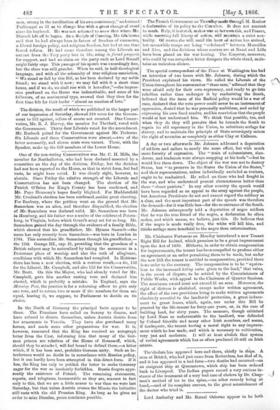Mr. Chichester Forteacue on Monday introduced a new Tenant Right
Bill for Ireland, which promises to be a great improvement upon the Act of 1860. Hitherto, in order to obtain compensation for improvements, the tenant has been compelled to produce either an agreemenkor an order permitting them to be made, but under the new Bill the tenant is entitled to compensation, provided there is-no order to the contrary. The compensation is to be " equiva- lent to the increased letting value given to the land," that value, in the event of dispute, to be settled by the Commissioners of Public Works, with appeal to. the Chairman of Quarter Sessions. The maximum award must not exceed Si. an acre. Moreover, the right of distress is abolished, except under written agreement, the effect of the two provisions being to make written agreements absolutely essential to the landlords' protection, a great induce- ment to grant leases, which, again, can under this Bill be granted by the life-tenant for forty-one years, or, in the case of building land, for sixty years. The measure, though criticized by Lord Naas as unfavourable to the landlord, was defended by Colonel Greville and many other Irish members, and seems, if inadequate, the tenant having a moral right to any improve- ment which he has made, and which is necessary to cultivation, very just and moderate. It will at least abolish that system of verbal agreements which has so often produced ill-will on Irish estates:






























 Previous page
Previous page